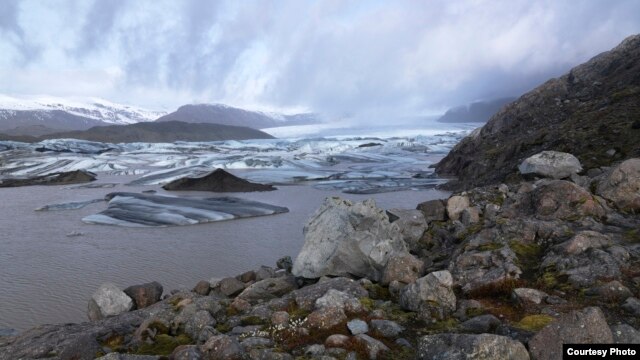11/22/2015
Melting Glaciers on Climate Talk List in Paris
Next week nearly 120 heads of state and government will gather in the City of Lights to discuss ways to cut harmful pollution.
President Barack Obama, China's Xi Jinping and Russia's Vladimir Putin are scheduled to attend. They will try to reach an agreement to fight changes in the Earth’s climate.
The meeting is known as COP21. The U.N. says it wants an agreement among nations to limit the rise in world temperatures to 2 degrees Celsius.
Before the terrorist attacks, France hosted a pre-summit meeting. France's Laurent Fabius told journalists that “the task ahead is considerable.”
Governments are discussing how to lower harmful gas released from burning fossil fuels, like oil and gasoline. These have been blamed for climate change.
Experts warned recently that a major glacier in Greenland is quickly melting and falling into the Atlantic Ocean.
If the entire glacier in the northeast of Greenland melts and falls, global sea levels could rise by a half meter.
The study, published in the journal Science, said the glacier melted three times faster than earlier. Known as Zachariae Isstrom, the glacier is losing 5 billion tons of mass per year, according to the study.
The glacier is dumping many icebergs into the ocean. That will raise sea levels in future decades, Jeremie Mouginot wrote. He is the study’s lead author and a professor at the University of California-Irvine.
The study based its findings on 40 years of data from satellite and aerial surveys. They looked at the shape, size and position of glacial ice.
Warmer ocean water is eroding the glacier from below. Warmer air temperatures are melting it from above. Another Greenland glacier is also melting, but not as quickly because it is in a protected location.
The study said the two glaciers make up 12 percent of the Greenland ice sheet. It said if they fully collapse, that would increase global sea levels by more than one meter.
Greenland is near the icy North Pole of the planet.
However, another recent study said that ice in Antarctica at the South Pole is growing.
In the Journal of Glaciology, NASA said satellites showed the Antarctic ice sheet gained 112 billion tons of ice from 1992 to 2001. The gain slowed to 82 billion tons from 2003 to 2008.
That is what Jay Zwally said. He is a glaciologist with the NASA Goddard Space Flight Center in Greenbelt, Maryland. He is the study’s lead author.
Critics question the study. Many other studies have found that Antarctica is generally losing ice.
Zwally said he agrees with others that ice is melting in the Antarctic Peninsula and West Antarctica.
But, he says that East Antarctica and other parts are gaining ice.
“There, we see an ice gain that exceeds the losses in the other areas,” he said.
Zwally and his team used satellites to measure changes over large and small areas.
Snowfall is not common in Antarctica because it is technically a desert. Antarctica is a dry desert, with cold, brutal weather.
http://learningenglish.voanews.com/content/melting-glaciers-and-climate-talks/3056901.html
Questions.
1. What is the biggest reasons for melting glaciers?
2. How do we have to do to prevent the environmental pollutions? and especially what?
3. What is COP-21?
4. There are many forms of climate change summit, and every year the global leaders gather to discuss climate change and make some resolution to protect the earth, but environmrntal pollution is getting serious. how do you think about that?
5. what is your individual act to reduce the pollution?
*Added article
http://www.arirang.com/News/News_View.asp?nseq=185790
President Park called for collective international efforts for a new deal on tackling climate change.
Addressing some 1-hundred-40 heads of state at the opening session of the UN Climate Change Conference in Paris on Monday President Park reiterated South Korea's goal to slash greenhouse gas emissions by 37 percent by 2030.
Over 1-hundred-60 countries which account for 90 percent of global emissions have put forward their climate targets for post-2020.
President Park said Seoul will reach its goal by fostering a new energy industry.
( )
"Korea will gradually make zero-energy buildings obligatory, and we will shift all large factories to smart factories using information and communication technology. Korea's signature Jeju Island will be transformed into a carbon-free island using only renewable energy and electric cars."
( , ICT . 100% carbon-free island .)
By doing that, President Park said Korea will create a new market worth 100 billion U.S. dollars by 2030 and make 500-thousand jobs.
As an end product of this year's global climate talks, world leaders are aiming to achieve a successor treaty to the 1997 Kyoto Protocol which expires in 2020.
Stand-up)
"On Tuesday, President Park will give a special speech at the UNESCO headquarters, becoming the first South Korean leader to do so. She will then leave for Prague for a summit with the Visegrad group comprised of the Czech Republic, Slovakia, Hungary and Poland.


